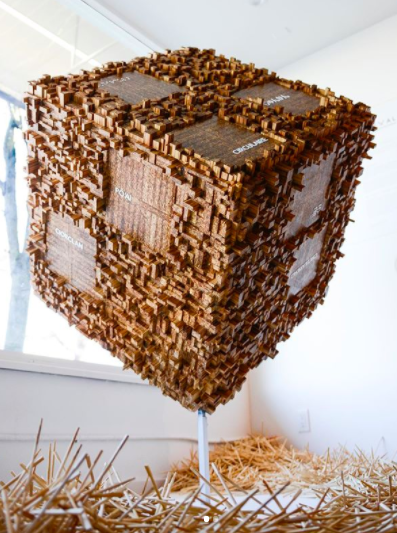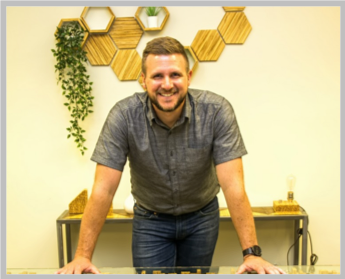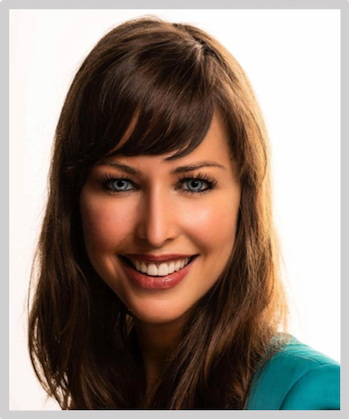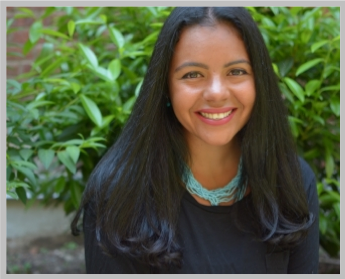Felix Böck is the CEO and Founder of ChopValue, a company that was founded to try and help address the devastating impact that waste has on the environment. In Metro Vancouver alone, over 100,000 disposable chopsticks are thrown out daily, which led Felix into initiating a chopstick collection program that has now evolved into a full-fledged business model of recycling used chopsticks and creating beautiful circular economy wooden products. ChopValue manufactures a wide-range of products, including sustainable home décor, zero waste furniture, and eco-friendly custom solutions for businesses and real estate developers. Many of their customers are happy to support their mission to extend the life of an everyday product that would have otherwise ended up in the landfill.
NEXUS HQ interviewed Felix to learn more about what inspired him to start his company, how to demonstrate leadership in making a circular economy viable, and growing the awareness and reach of his brand.
Learn more about ChopValue here: https://chopvalue.com/
Follow on social media: @chopvalue @FelixBock
Tell us about your company. What is your ‘why’ and how did it come to be?
I always say it was a humble little chopstick that sparked a ridiculous idea that created a viable circular economy business. The company was founded on the base emotion of frustration, because I noticed how resource inefficient we were even though we were praising ourselves that we were doing so much good for the environment, especially in a city such as Vancouver that really sells itself as a green city.
I was looking around myself in my field of expertise, which is wood engineering, and noticing all of these underutilized resources that we have in the city, ranging from demolished construction sites to waste wood in landfills. I just started digging in a little bit more on how I could send a very powerful message, with a tangible and relatable story, and that ended up being that you could create a viable business with humble little chopsticks.
What’s the origin story of the ChopValue name?
After we launched the recycling program I went on summer vacation for two weeks. When I returned we picked up all these recycling bins filled with chopsticks and we threw them all into one big container and looked at them. In the first two weeks of our pilot program, we had collected around 60,000 chopsticks, just from a few restaurants in the closest neighborhoods to the university. Then I looked at this container and thought “Chop Value”. We could create value from the discarded chopsticks. It kind of comes from a technical term that is used known as ‘value-added engineered products’, so when you’re adding value to the initial resource to create a value-added material.
How would you describe ChopValue to a 6-year-old?
I would say: Just imagine, the chopstick that you were eating with for 20 or 30 minutes, it actually traveled 6,000 miles, all the way from a bamboo forest in Asia. Instead of throwing it away, I’m collecting it and putting it under high pressure and steam and heat and creating it into new material. I’m bringing it back into the circle of life. That’s the easiest explanation and usually, they never forget it again when they eat with chopsticks.
Given the current state of affairs, how has ChopValue responded to, or been impacted by, COVID-19?
We are challenged with the supply of chopsticks. We work with a waste industry that is driven by the consumer throwing away something that had no value before. Right now, we can’t access the chopsticks that the end consumers are taking home from all that takeout. It’s logistically not something we’re looking into, unless we were to start partnerships with Uber Eats type businesses for example. But even then, it would not be in the volumes that we are used to. So now we have to work off our buffer space until restaurants re-open.
We are also working on refocusing some of our target markets, where we identified sales for. For example, our main target market is restaurant and hospitality, because it’s a beautiful story to tie back the recycling program into the end market. Knowing that this industry has been hit the hardest we have to think of who else do we sell to instead.
What’s one thing that is helping you adjust to the new normal? A work from home hack?
My job right now is to keep the team spirits up. We do have a production team coming to work, in a safe work environment of course, and they need to see me, they need to see that I have the confidence to come to work and be there, and that’s why they can be there too.
The rest of the corporate team, they’re all working from home. So the habits we started there are scheduling a once a day “un-productivity” hour. It’s not only a management trick, it’s also a fun way of catching up with each other, and because after a few minutes we talk about work anyways. It’s also helpful so we don’t have to constantly schedule meetings to talk with one another. I’m very productive leading up to this “unproductive” hour because I know I have everyone in front of me and that I can talk about something I’ve wanted to talk about anyways.

Share a little more about ChopValue vision and what you feel is its greatest impact on the world.
I think the greatest impact we have had so far is the leading by example attitude. I truly believe in focusing on digestible pieces, so the little steps that lead to something bigger, and tackling what you can handle right now, tackling the fields within your expertise, instead of changing the entire world at once.
I believe ChopValue is that thought leadership piece of the circular economy that everyone can understand, everyone can relate to and then adapt it to their own processes or their own industry and their own materials that they are expert in. Hopefully some will adopt some of the values that we have, which is why we are making everything public. Our urban impact report online is a 60-page report that we invest in every year to show everyone what we do and how we do it, so that they can either use it as a template or just adapt it to their own industry.
What are some of ChopValue’s core values?
Transparency, for sure, and open communication, are our shared values.
Resource efficiency is a technical core value that we practice with everything, it’s embedded from our design all the way to packaging materials. Then curiosity is a big component, it’s one of the biggest things that I look for in every intern or every new applicant. How do they ask questions and how curious are they to find out? Questions like how can we set up partnerships differently? How can we communicate or market our products differently? I’m so curious to see how they do it and why that works for them. So that curiosity can really go from Excel spreadsheets all the way to product design.

What accomplishment are you most proud of to date?
I think what I’m most proud of right now is how such a humble brand attracted such an amazing team. I think our biggest achievement is the strength of our team. I feel like we can tackle anything. The positivity that we’re currently exuding despite this pandemic is quite motivating to wake up to every morning. It sounds cheesy but it’s the reason why I come to work.
Where is the biggest area of support needed for ChopValue?
The strategic sales component. I’m often describing it as we are hitting a ceiling, where the story and the inbound traffic now has to be supported by a very strategic focus on who we work with and what sectors we are targeting that could benefit from our products the most and that see the value proposition of our products that are carbon neutral, sustainable, and a well-designed quality option of wood.
I think we were on the right track, focusing on restaurant hospitality, it was that the obvious fit, but now we have to re-target and re-focus all the other beautiful offerings we have, especially to online retailers and to large scale distributors who collaborate with us for new product launches or just carry our products in their portfolio.
I think our biggest challenge is just to be found. Today if someone wants a desk and has $1,000 to spare to set up their home office, how do they know that ChopValue exists? Or why would ChopValue be the obvious option for them? That’s what we have to answer.
If I were to have an ask for help right now, I think the biggest issue for us is how do we transfer all this positive energy and the impact we’ve created and our truly positive reputation, which is so rare for new brands. I feel like we’ve done our homework and created this entire ChopValue story in a very transparent and humble way, but the one thing that we need to prove is that we can scale in terms of money. We have proven the single micro factory concept and that this can be a beautiful little standalone small business, but what we truly have to prove is how to grow this in the measures that we need to. We need a strong introduction or someone who says “I’m absolutely in love with this!” who understands that this is thought leadership that they are supporting and not just a little vitamin product. So, if I could somehow through NEXUS get introduced to a real advocate, that not only wants to do a favor, but actually falls in love with our product, I think that could really elevate us.
What is your favorite NEXUS memory?
I got introduced to NEXUS through the Fukushima trip last year. I remember I was actually very suspicious before because I had no concept of NEXUS, and I’m a fairly traditional German, you know, I just want to work and want to be productive. I have no time for sitting in circles and enjoying some stories. But something about the NEXUS Fukushima summit was so so special. I think it was the size of the summit, around just 100 people. It was definitely the fact that we stayed all in one place and didn’t leave for four days and we were all together. Every single person. Plus the fact that no one handed out a single business card, no one had a title on their name card. It was so well thought out that you developed true connections. I have trouble even staying in touch with just two friends of mine from Germany, and yet I probably message around 15 to 20 of these NEXUS members so frequently, some of them close to daily since that summit, and I’m shocked how that happened. There was also I think that emotional connection to what happened in Fukushima, where there was a nuclear disaster, that made the kickoff of the summit hit so close to home and close to your heart. That built the connection so instantly.
Who is your dream connection/person you want to meet?
Barack Obama is my hero. The way he talks, the way he carries himself, the way he communicates with his family, and talks about his wife Michelle, is actually incredible.
The cheeky part of me wants to meet Matt Damon, because I’m quite often using his saying that he has where he “needs to science the shit out of it” like how he made that potato thing happen on Mars. So I really would love him to start our recycling program of chopsticks on Mars, for the Martians too. Haha. I need to pitch that to them. I should meet him as well.
What celebrity would play you in the biopic of ChopValue?
Matt Damon. Or Chris Pratt.
What show are you currently binge-watching when you aren’t busy running ChopValue?
I love all these limited serious Netflix shows that they’re bringing out. They’re doing this very strategically because they’re only three or four episodes that get you really hooked. I watched Dirty Money. I watched Hillary the other day. I’m really into these well-done documentaries that have that captivating experience where you really want to watch it and find out more.
Who are three of the most inspirational people in your life?
From a personality and composure standpoint, and because I used to be fairly active on the tennis courts, Roger Federer was always a role model I looked up to. It might be a very stereotypical answer but it’s true because he is a great person.
I think there’s one experience that brand marked me in trades. I left school when I was very young, just 15, to become a carpenter and do woodworking. My first boss was very rough. He was a huge hassle in the first three years of my apprenticeship; there was always an attitude that he gave me every morning and he would say “You either quit, or you come out of this as the best!”. Sure enough, after three years, I graduated as the best carpenter of the guilds in South Germany, out of thousands of graduates. At the time he just looked at my piece and said, “Well I guess the others this year were really bad. This is why you won. But I always told you you’re the best.” I think that really marked me along the way, and he definitely played a big role in my career, even though he doesn’t know it.
Third is probably my best friend’s father. He built a little trade shop from 10 people to now 1,500 workers and runs a full electrical engineering company. I always looked up to him on how composed and well organized he was and how well managed was the business.
The inaugural NEXUS Accelerator cohort is in several industries but have you noticed any similarities? Or another fellow you have seem to have synchronicities with?
It’s an interesting dynamic because I feel like we are all in a very similar mindset. The similarities don’t really pertain to what business we are in. I think we can discuss the exact same challenges and topics across the board and across industries, especially in these challenging times. It’s really been about the personal common interests and the personal common challenges we all face, so that’s really nice to see. They’re all incredible and we have the same work ethics.
When travel resumes post-COVID-19, where are you going on vacation? Or where do you first want to go, even if not vacation?
Definitely home. Because currently I am not allowed to leave the country, because of many reasons, not only because of health and safety but also because of visa status. I wouldn’t be able to re-enter Canada, which would be harmful for the business because I have to be here for my team. So I have double pressure right now, feeling the desire to be at home to take care of family but also I’m a bit anxious that if something were to happen (because family comes first) then it would also mean that I would have to come up with a contingency plan for my business, which is sad to have to think that way all the time, but it’s just the reality.
What’s one (or two) books that you found most helpful on your entrepreneurial journey?
I think The Founder, the McDonald’s related movie, is a really well-done movie. I’m not sure how much of it is true but I took one thing out of the film for franchising. He wanted to franchise McDonald’s and he was hunting the most talented MBAs out there that could open up their first franchise locations, and they all failed because they didn’t have skin in the game. They didn’t have heart when it came to their own restaurant. The first big successful restaurant chain was a freshly married couple, very young professionals, who came from the countryside and were proud to own their first burger spot and they treated it as if it was a family business. This pretty much becomes the franchise that you want, where you have that shared ownership feeling, the emotional investment, and you want someone to really care about how this location is running in your city or in your community. That is what I took out of the film.
Given what you know now, what would you tell your younger self when you first started this company?
It doesn’t get better. You’ll be dealing with different problems at different stages of your life. At some point, you’ll be dealing with things that as a 15-year-old would have brought you completely off track, and now you find to be a piece of cake. The beauty is you’re developing a thicker skin as you go. The problems you have today are things that you have to go through in order to learn and prepare for the bigger problems and challenges to come. Or even if it’s something that doesn’t impact you personally, because of your built-up capacity, you can help others deal with things as well.
As a young professional, when you talk to a 45-year-old CEO you may not understand where their calmness and composure comes from when facing huge problem situations. Well, now I understand where it’s coming from.

Could you tell us more about how this magnificent cube came to be? What is the messaging behind this piece?
It’s combining our design standards of minimalism and simplicity with an amazing feature pattern and the concept of a circular economy. I find it very ironic that “circular economy” has the world circular in it but none of our designs actually have radiuses or are circular. That’s for a reason because we are trying to develop products that are timeless and minimalistic, and that’s why they all have straight lines and are simplistic. There’s a reason why we don’t have any round shapes because they usually tend to create more waste. This cube is actually made one hundred percent out of off-cuts of production, allowing us to be zero waste in our process. It not only represents 100,000 chopsticks that are thrown out every day in Vancouver, but it is also made out of our off-cuts from our main production line. I think there were so many possible interpretations coming together with this piece that we were asked to feature it in an art gallery, which was an obvious fit.








Recent Comments